Search results 39 Found
Die Hochzeit von Lyon. Novelle. Mit vier [signierten] Lithographien von Hans Fronius. Herausgegeben und mit einem Nachwort von Erich Fitzbauer.
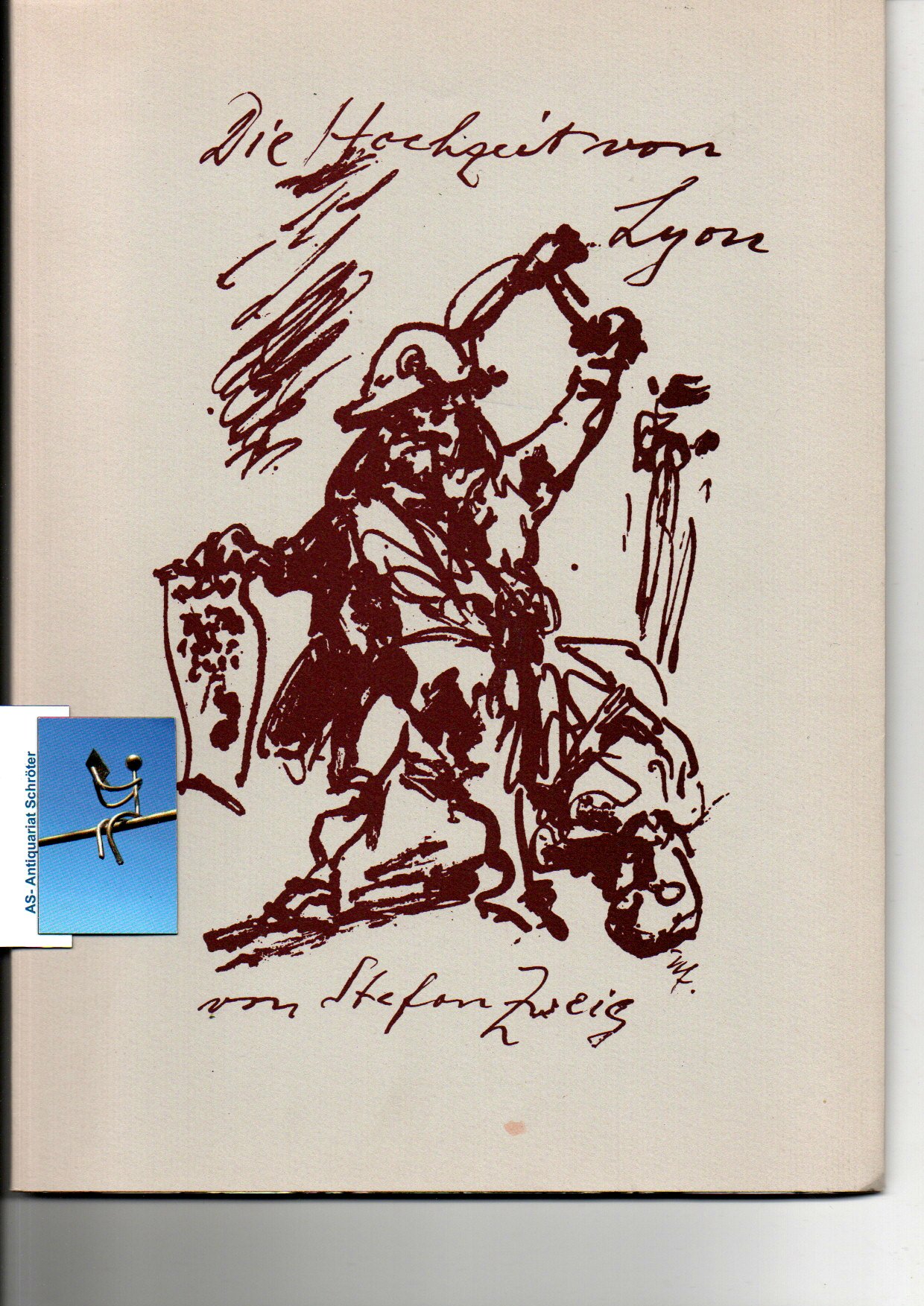
Die Hochzeit von Lyon. Novelle. Mit vier [signierten] Lithographien von Hans Fronius. Herausgegeben und mit einem Nachwort von Erich Fitzbauer.
Zweig, Stefan (1881-1942):
- Publisher: Wien, Edition Graphischer Zirkel
- Date published: 1980
- Format: Softcover
29(1 + 4 Graphiken) S., OKarton mit illustriertem OU (dieser mit Abriebspuren), 4°, Druck auf Zerkall-Bütten, Satz in der Times Antiqua. Eingebunden sind 4 ganzseitige Original-Lithographien von Hans Fronius, sämtlich signiert. Exemplar 305 von 400 Exemplaren. 13. Druck der Edition. Tiessen 79. Erschienen zum 100. Geburtstag von Zweig. Fine copy with 4 handsigned original lithographics. Sprache: Deutsch Gewicht in Gramm: 1000
antiquariatschrterutajaninestrmer-87.48-cff157e7be8bbb08c806827013ba70d9
Die Hochzeit von Lyon. Novelle. Mit vier Lithographien von Hans Fronius. (= 13. Buchpublikation der Edition Graphischer Zirkel).
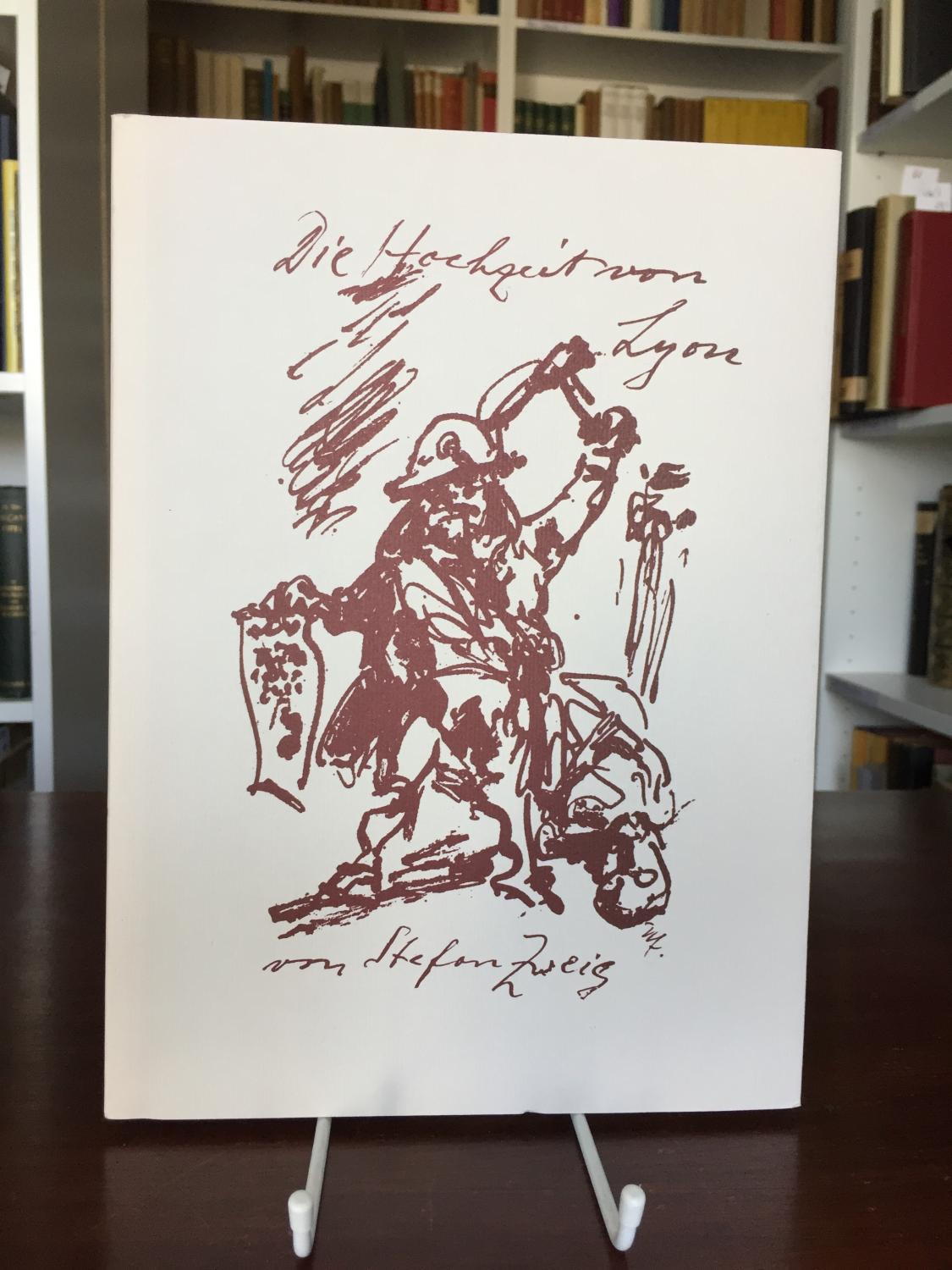
Die Hochzeit von Lyon. Novelle. Mit vier Lithographien von Hans Fronius. (= 13. Buchpublikation der Edition Graphischer Zirkel).
Zweig Stefan,
- Publisher: Edition Graphischer Zirkel, Wien
- Date published: 1980
- Format: Hardcover
OBrosch., SU, kl 4°, 29 (3) S., Nr. 354 von 400 Ex., mit 4 signierten Originallithographien von Hans Fronius, EA, guter Zustand,
antiquariatseibold-87.48-2b6b13b1a735424489465ab79e75099d
Die Hochzeit von Lyon.
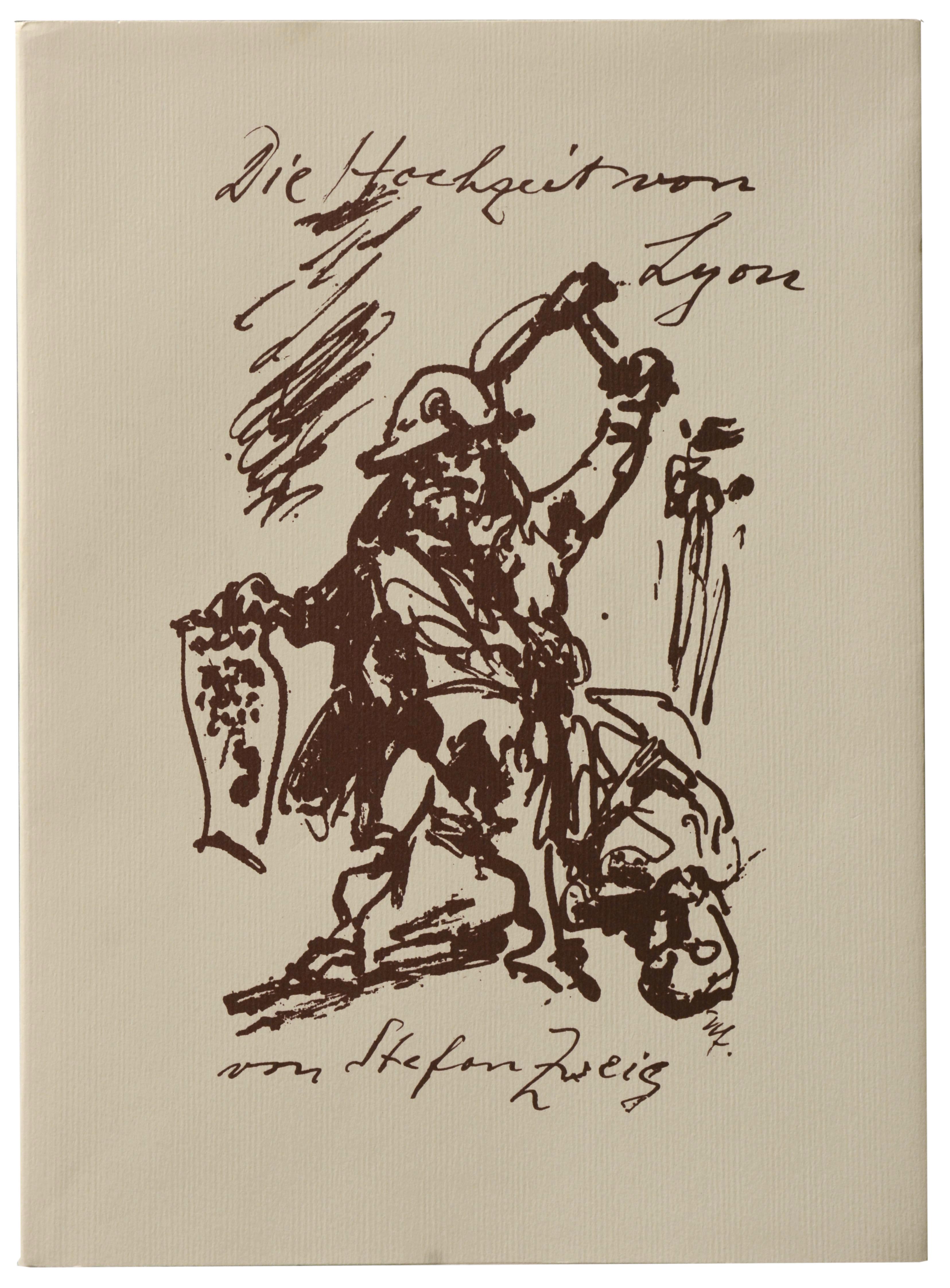
Die Hochzeit von Lyon.
FRONIUS - ZWEIG, Stefan.
- Publisher: Wien, Edition Graphischer Zirkel.
- Date published: 1980
- Format: Softcover
Gross-8°. 29 S., 1 nn Bl., mit 4 Originallithographien von Hans Fronius. Originalbroschur mit illustriertem Originalschutzumschlag. Eins von 400 nummerierten Exemplaren. Die Lithographien vom Künstler signiert. - Erschienen als 13. Buchpublikation der Edition Graphischer Zirkel. - Sehr gutes Exemplar.
antiquariattresoramroemer-87.48-854d973992acf66b9149a74fdb8705fc
The Invisible Collection

The Invisible Collection
Stefan Zweig
- Publisher: Ursus Books
- Date published: 2007
- Format: Hardcover
Includes "missing" frontispiece designed by Joseph Goldyne consisting of a piece of original seventeenth century paper. Originally printed in an edition of 100 numbered copies by Peter Koch. This copy is out of series, but still signed in pencil under colophon by Koch and Goldyne.
moesbooks-100.00-171289f5006141257d81e672b5c4f63c
Frühlingsfahrt durch die Provence. Ein Essay. Herausgegeben von Erich Fitzbauer.
Frühlingsfahrt durch die Provence. Ein Essay. Herausgegeben von Erich Fitzbauer.
Fronius. - Zweig, Stefan:
- Publisher: Wien, Verlag der Internationalen Stefan-Zweig-Gesellschaft
- Date published: 1965
- Format: Hardcover
4 Bll.; 1 Bl. Mit 7 ganzseitigen Original-Lithographien von Hans Fronius. Quer-4°. Obrosch. .enthält Zweigs Prosastück 'Frühlingsfahrt durch die Provence', welches in Buchform nur ein einziges Mal, in dem Bändchen 'Fahrten' . erschienen ist. Die Entstehung fällt in die Zeit vor dem Ersten Weltkrieg. Die Skizzen, auf die die Lithographien von Hans Fronius zurückgehen, entstanden während einer Südfrankreich-Reise im April 1962". - Nr. 58 von 450 num. Exemplaren von Hans Fronius im Impressum signiert. - Umschlag verstaubt und stellenweise bestoÃen, innen gut erhalten. "Fünfte Sonderpublikation der Internationalen Stefan-Zweig-Gesellschaft".
antiquariatandreasmoserinhwklgel-107.16-dcf5b67d1f1457484604d38876242d56
Fragment einer Novelle
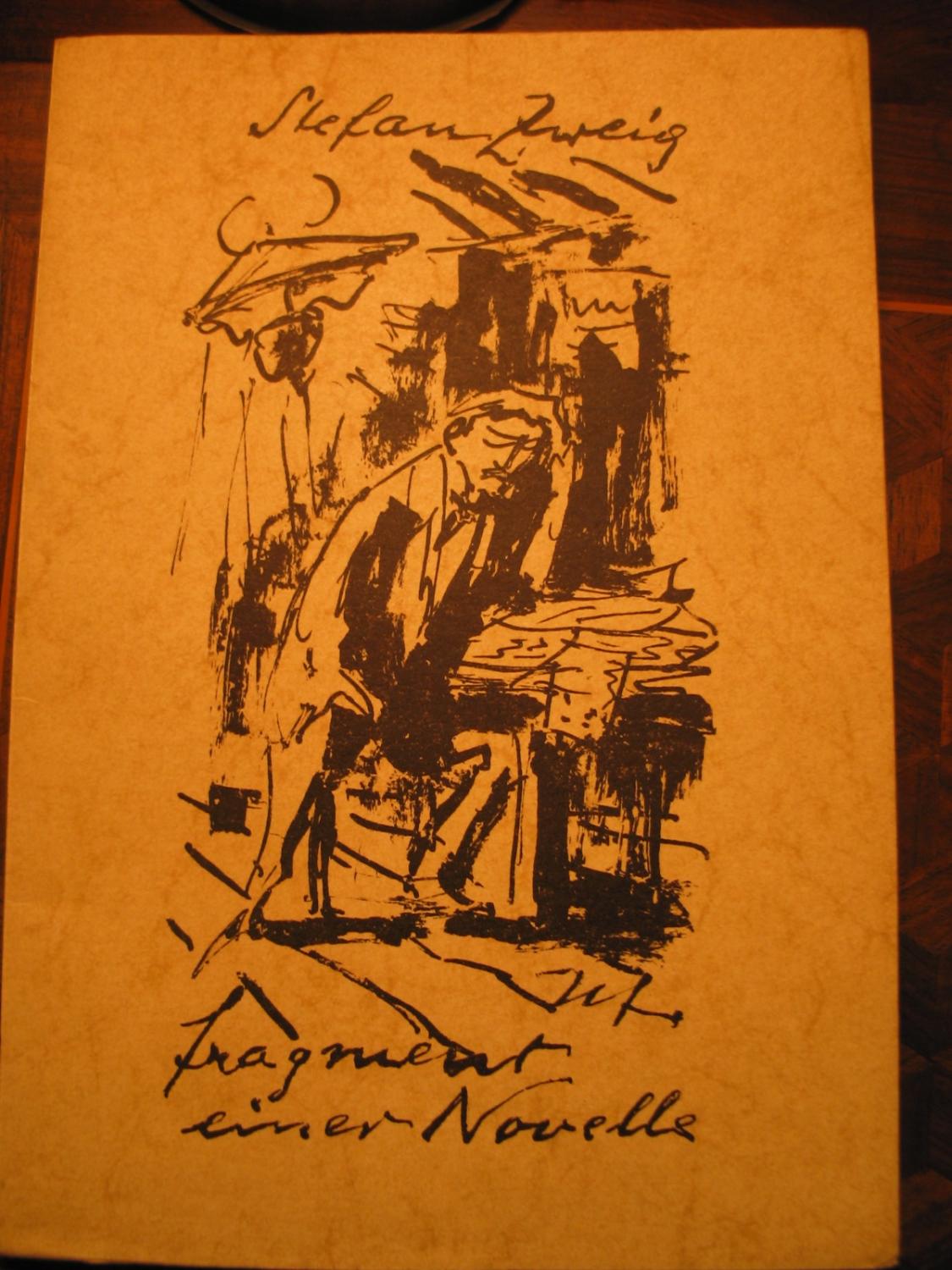
Fragment einer Novelle
Stefan Zweig
- Publisher: Erich Fitzbauer
- Date published: 1961
- Format: Softcover
. Mit 4 Lithographien von Hans Fronius. (14) Bll. Gr.-8vo. Orig. illus. Brosch. Zweite Sonderpublikation der Internationalen Stefan-Zweig-Gesellschaft". Eines von 500 num. Exemplaren auf Zerkall-Bütten, von Fronius im Kolophon signiert; hier N.109; sehr Gutes Exemplar;
magnus-136.69-e815215993e11af2d4b279ec417d64e7
The Invisible Collection - finely printed in an edition of 100 copies

The Invisible Collection - finely printed in an edition of 100 copies
Zweig, Stefan, illus. Joseph Goldyne
- Publisher: Ursus Books
- Date published: 2007
New York: Ursus Books, 2007. First printing. Hardcover. Near Fine. No. 89 of 100 copies signed by the printer, Peter Koch, and artist Joseph Goldyne, who has supplied a blank frontispiece on 17th century paper, signed by him on the paper in pencil as well as at the colophon. 8vo, orange-pink laid paper boards, just short of fine copy (tiniest bump to top edge of front board). Koch printed this in Berkeley. Comes with original description folded in from Ursus Books. A fable about collecting; Goldyne, in addition to being a well known California artist, is also a renowned collector.
commoncrowbooks-140.00-b2bd184ddd4dd8a5933a8bbf29db8b27
Fragment einer Novelle. Mit 4 Lithographien von Hans Fronius. Hrsg. von Erich Fitzbauer.
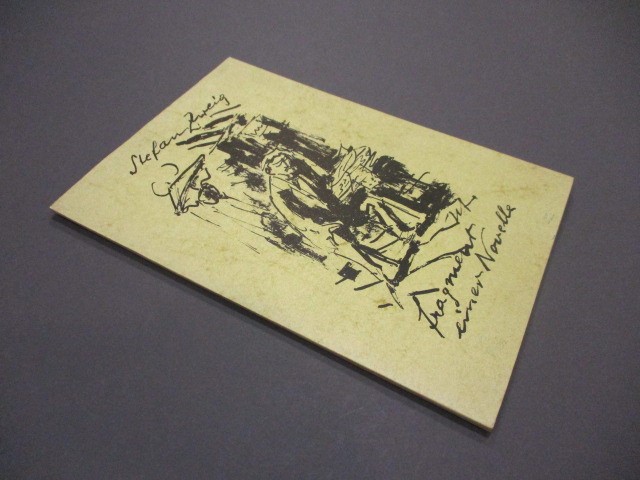
Fragment einer Novelle. Mit 4 Lithographien von Hans Fronius. Hrsg. von Erich Fitzbauer.
Zweig, Stefan:
- Publisher: Wien, Verlag der Internationalen Stefan Zweig Gesellschaft,
- Date published: 1961
- Format: Softcover
10 Bll. 4 Original-Lithographien von Hans Fronius. Nr. 8 von 500 von Hans Fronius signierten Exemplaren. - Die Erstausgabe war 1929 erschienen.- Titel mit einer 5-zeiligen signierten und datierten Widmung von Hans Fronius. - Leicht gebräunt. *** *** Copyright: Matthaeus TRUPPE Buchhandlung & Antiquariat - Stubenberggasse 7 - A-8010 Graz - ++43 (0)316 - 829552 *** *** Sprache: Deutsch Gewicht in Gramm: 200 Gr.-8°. OKart. (kl. Gebrssprn.).
matthaeustruppeantiquariat-140.40-72ddd9b279746d90484060bf3aedd0d0
THE INVISIBLE COLLECTION

THE INVISIBLE COLLECTION
Zweig, Stefan
- Publisher: Ursus Books
- Date published: 2007
New York: Ursus Books, 2007. Frontispiece by Joseph Goldyne. Pp. 16+[2](colophon, verso blank), hand-tipped frontispiece, the publisher's device on title page and a couple of small text decorations printed in light red/brown; tall demy 8vo; black morocco-backed light brown papered boards, spine lettered in gilt, printed paper title label on upper board, top fore-corner of lower board a trifle bruised, book label of David Levine, Sydney, on the upper pastedown; Ursus Books, New York, 2007. One of 50 numbered copies thus, signed by the artist and printer. *Designed and printed by Peter Rutledge Koch with Jonathan Gerken and Jonathan Fetter-Vorm at Peter Koch Printers, Berkeley, California. The frontispiece is an original etching, As The Blind Remember, by Joseph Goldyne, printed on seventeenth century paper and signed in pencil by the artist. Zweig's short story was originally published in 1925, as Die unsichtbare Sammlung.
kaycraddockantiquarianbookseller-264.16-24ba95b2429d31b93f92beb2a360471d
Jeremiás. Drámai költemény kilenc képeben. Vér Andor fordÃtása. [Jeremiah, a Drama in Nine Scenes. Translated by Andor Vér.]

Jeremiás. Drámai költemény kilenc képeben. Vér Andor fordÃtása. [Jeremiah, a Drama in Nine Scenes. Translated by Andor Vér.]
Zweig, Stefan
- Publisher: A fordÃtó kiadás (Neufeld Zoltán)
- Date published: 1933
(Budapest): A fordÃtó kiadás (Neufeld Zoltán), 1933. First Hungarian edition. Signed by the author. Inscribed by the translator. Limited edition up to hundred copies, numbered. In publisher's gilt cloth. Cover lightly stained. In fine condition.. First Hungarian edition. Signed by the author. Inscribed by the translator. Limited edition up to hundred copies, numbered. In publisher's gilt cloth. 159, (1) p. One of the one-hundred signed copies of the first Hungarian edition of Jeremiah, Zweig's pacifist play. Also inscribed by the translator.
foldvaribooks-1041.20-8989a0a2fbbbb9a4f4a2700390ac6b52
Beware of Pity
Beware of Pity
Zweig, Stefan
- Publisher: The Viking Press
- Date published: 1939
New York: The Viking Press, 1939. First Edition. Hardcover. Good. First American edition, translated from the German by Phyllis and Trevor Blewitt. 8vo. 498 pp. Blue cloth, with gilt lettering to the front board and spine, corners rubbed, spine dulled with faint spots around the bottom, spine foot bumped and rubbed, head worn, with a 2cm tear in the cloth. Without the dust jacket. Bookplate of Liliore Green Palmer to front paste-down. Signed by Zweig in purple to the first blank. Clean throughout and the binding tight and square. Good candidate for a rebind, or quite alright as it sits without the dj.
karolkrysikbookscpbfa-1450.60-826d952803aaedb82bb3926abfae1899
Frans Masereel

Frans Masereel
[Masereel, Frans]; Arthur Holitscher; Stefan Zweig
- Publisher: Axel Juncker Verlag
- Date published: 1923
Berlin: Axel Juncker Verlag, 1923. First edition. Leather bound. Very good. 177pp. Large octavo [26 cm] Bound in full red Morocco with raised bands and the title gilt on the backstrip, boards embossed in blind. Top edge gilt. Marbled endsheets and pastedowns. Moderate rubbing to raised bands of spine. Small bookplate on the front free endsheet. Signed by Masereel on the page bearing his self-portrait p. [31] (though heâs docketed â32â to the colophon). Includes 42 woodcut illustrations and a pasted-in photograph of Masereel on verso of title. This edition was limited to 150 numbered copies on handmade paper, this is copy 88.
kensandersrarebooksa-1500.00-7def7e67c714dfe82a2f93879bb26adb
The Old-Book Peddler and Other Tales for Bibliophiles

The Old-Book Peddler and Other Tales for Bibliophiles
Zweig, Stefan; Koch, Theodore W. [Translator]
- Publisher: Northwestern University / The Charles Deering Library
- Date published: 1938
Evanston, IL: Northwestern University / The Charles Deering Library, 1938. Second Printing. Hardcover. Near Fine. Second printing. Signed by Stefan Zweig in purple ink on the front free end paper. Publisher's patterned red paper covered boards with title labels on spine and upper board. Near Fine with light toning and shelf wear to covers. Signed by the Austrian writer whose work inspired the 2014 Wes Anderson film, The Grand Budapest Hotel.
burnsiderarebooksa-1650.00-2d86d984bc1924363d3e328ae907eb29
Amok

Amok
Zweig, Stefan
- Publisher: Insel-Verlag
- Date published: 1925
Leipzig: Insel-Verlag, 1925. New German Edition. Near Fine. New edition, reprint (33-45 thousand), originally published in 1922. Signed by Stefan Zweig in purple ink on the front free end paper. Publisher's orange cloth with spine decorated in gilt and black and front cover lettered in gilt, lacking the dust jacket. Near Fine, with faint fading to the spine, and an owner bookplate to the half-title page. A lovely copy, signed by the author. Text in German language.
burnsiderarebooksa-1850.00-e350b4085dab50d5de6831891e1e48cd
The Old-Book Peddler and Other Tales for Bibliophiles

The Old-Book Peddler and Other Tales for Bibliophiles
Stefan Zweig [Signed] Translated by Theodore W. Koch
- Publisher: Northwestern University The Charles Deering Library
- Date published: 1938
IL: Northwestern University The Charles Deering Library, 1938. Book. As New. Hardcover. Signed by Author(s). 16mo - over 5¾ - 6¾" tall. THE OLD-BOOK PEDDLER AND OTHER TALES FOR BIBLIOPHILES by Stefan Zweig. Evanston: The Charles Deering Library, 1938. Second printing signed by the author. Cloth Hardcover, 4 1/8" x 6 1/8". .
peterausterncobooksephemerabrooklynbooks-2000.00-f16b9378e35ff223ed300f5ec708d57d
Romain Rolland. Der Mann und das Werk

Romain Rolland. Der Mann und das Werk
ZWEIG Stefan
- Publisher: Rütten & Loening
- Date published: 1923
Frankfurt am Main: Rütten & Loening, 1923. Fine. Rütten & Loening, Frankfurt am Main 1923, 14x20,5cm, reliure de l'éditeur. - Edition illustrée de 7 photographies et de 3 fac-similés. Reliure de l'éditeur en demi toile tabac, dos lisse, plats de cartonnage sable comportant de petites éraflures. Rare envoi autographe signé de Stefan Zweig à Ernst Elass. [ENGLISH TRANSLATION FOLLOWS] With seven photographs and three facsimiles. Rare autograph inscription signed by Stefan Zweig. Publisher's half brown cloth, yellow paper boards, slightly rubbed.
rarebookslefeufolleteditionoriginale-2228.15-a6ebcf0e8614c2d2eb60470141c9c2df
Beware of Pity

Beware of Pity
Zweig, Stefan; Phyllis and Trevor Blewitt [Translator]
- Publisher: The Viking Press
- Date published: 1939
New York: The Viking Press, 1939. First Edition. Very Good. First American edition, first printing. Signed by Stefan Zweig on the front free endpaper. Bound in publisher's royal blue cloth with gilt lettering; lacking dust jacket. Very Good with shelf wear at extremities; slight lean to binding, spine faded and mottled, lettering is quite rubbed. Offsetting to end sheets with remnants of small bookseller ticket to rear; contents lightly tanned. Scarce historical novel that was later adapted into film by Maurice Elvey in 1946. Wes Anderson loosely based The Grand Budapest Hotel off this work.
burnsiderarebooksa-2500.00-91e696acb0c78414d2904a1fb25bd942
Joseph Fouché

Joseph Fouché
ZWEIG Stefan
- Publisher: Grasset
- Date published: 1931
Paris: Grasset, 1931. Fine. Grasset, Paris 1931, 13x21cm, broché. - Ãdition originale de la traduction française, un des exemplaires du service de presse. Mors de tête du premier plat et celui de queue du second très habilement restaurés. Envoi autographe signé en français de Stefan Zweig au journaliste et homme politique de gauche Georges Pioch. [ENGLISH DESCRIPTION ON DEMAND]
rarebookslefeufolleteditionoriginale-4703.87-2f37e62208f8f77c77d9b8556ac084f8
Lettre autographe signée adressée à Alfred Cortot et son épouse à propos du fonds de manuscrits de Richard Wagner : « J'avais la chance de pouvoir acquérir le lot entier un jour avant que Bayreuth envoyait une personne de confiance »

Lettre autographe signée adressée à Alfred Cortot et son épouse à propos du fonds de manuscrits de Richard Wagner : « J'avais la chance de pouvoir acquérir le lot entier un jour avant que Bayreuth envoyait une personne de confiance »
ZWEIG Stefan
- Date published: 1937
Londres, 1937. Fine. Londres 26 décembre 1937, 17,9x22,9cm, une feuille. - Lettre autographe signée de Stefan Zweig adressée à Alfred Cortot, deux pages sur un feuillet rédigées à l'encre violette. Superbe lettre autographe dans laquelle le fin collectionneur fait part de son acquisition de manuscrits inédits de Wagner à son ami Alfred Cortot qui lui-même doit à sa précoce découverte du compositeur allemand, sa carrière de chef d'orchestre. Cortot partageait en effet avec Zweig son « envoûtement quasi tyrannique [subi] avec autant d'ivresse que de ferveur » pour le compositeur. Zweig, qui parlait de sa collection comme « plus digne de me survivre que mes propres Âuvres » (Le Monde d'hier, 1942) refait pour son ami le détail de cette incroyable découverte de centaines de feuillets oubliés, comprenant de la correspondance intime de Wagner, des partitions et extraits de livrets d'opéras de sa main dont Le Hollandais volant, La sublime fiancée, Les Fées, La défense d'aimer (ou La Novice de Palerme) ainsi qu'une version orchestrale perdue de Rule Britannia. En ce mois de décembre 1937, alors qu'il est réfugié à Londres fuyant la terreur brune, Zweig s'enthousiasme pour des archives d'un temps où l'Europe intellectuelle vivait en parfait syncrétisme. L'écrivain pose un regard nostalgique sur les papiers de Richard Wagner, qui, comme lui, a passé sa jeunesse à parcourir les capitales européennes : « J'ai eu la chance extraordinaire de pouvoir mettre la main pendant un petit séjour à Vienne sur tout un lot de manuscrits musicaux et littéraires de Richard Wagner de sa première époque (Leipzig, Magdebourg, Riga et Paris) ». Parmi ces précieux manuscrits, se trouve entre autres le rarissime arrangement orchestral du chant patriotique anglais Rule Britannia, disparu pendant plus de soixante ans. Partageant sa passion de Wagner avec son ami le pianiste Cortot, il lui annonce sa découverte avec cet émerveillement si familier aux collectionneurs devant une trouvaille exceptionnelle :"" [...] Il contient des choses qui vous intéresseront spécialement par exemple la traduction complète (60 pages) la version française (inédite (je crois) du texte du ""Liebesverbot"") entièrement de la main de Wagner, puis les manuscrits d'une chanson de vaudeville ""Descendons la Courtille"" (qu'il faisait dans sa misère la plus noire) [...] presque trente pièces du plus haut intérêt et justement de l'époque la plus rare. Tout cela était caché pendant 50 ans dans une collection privée et j'avais la chance de pouvoir acquérir le lot entier un jour avant que Bayreuth envoyait une personne de confiance"". La lettre constitue un fascinant témoignage de la vie parallèle de Zweig, qui s'était forgé une réputation de collectionneur éclairé. Sa collection lui a par ailleurs inspiré une de ses plus belles nouvelles, La collection invisible (die Unsichtbare Sammlung) ainsi qu'un essai pionnier dans le Deutscher Bibliophilen Kalender (De la collection d'autographes considérée comme un art). Ses centaines d'autographes historiques, musicaux et littéraires du Moyen-Age au XXe siècle, étaient soigneusement répertoriés dans des catalogues et rassemblés dans la bibliothèque-musée de sa maison du Kapuzinerberg : ""Dans cette bibliothèque, ""lieu de culte"", il exerce aussi une véritable activité d'expert en autographes [...] La bibliothèque attirera un nombre de savants professeurs, parfois accompagnés de leurs assistants, qui n'hésiteront pas à revenir y travailler au calme des jours d'affilée, voire des semaines"" (Stefan Zweig, le voyageur des mondes, Serge Niemetz). Avec cette acquisition, Zweig voit se réaliser le rêve de tout collectionneur. Exilé depuis deux ans en Angleterre, et bravant la progressive fermeture des frontières de l'Europe, Zweig retourne à Vienne à temps et fait l'achat de ces documents exceptionnels, soustraits aux émissaires de Bayreuth qui rassemblaient déjà à l'époque une importante collection aujourd'hui gérée par le musée et la fondation Wagner. On reconnaît également dans cette lettre la curiosité insatiable de Zweig biographe, en recherche constante de matériaux inédits, de sources premières à intégrer dans ses études biographiques - la même année, il avait silloné l'Europe avec sa future femme Lotte en quête des portulans de l'époque de Magellan pour l'écriture de sa biographie. A Paris, entre deux visites à la Bibliothèque natonale, Zweig reste à l'affût des manuscrits les plus rares, s'arrêtant comme Marcel Proust avant lui chez le négociant en autographes Charavay. L'écrivain ne put malheureusement jouir de sa collection pendant très longtemps, contraint d'en vendre à son départ de Vienne au célèbre marchand Martin Bodmer, puis d'en laisser à nouveau à Londres avant son voyage sans retour pour le Brésil. La collection de manuscrits musicaux, historiques et littéraires de Stefan Zweig se trouve désormais partagée entre la British Library à Londres, la fondation Bodmer de Genève, et la bibliothèque nationale d'Israël. Admirable témoignage de la plus grande et prestigieuse acquisition de l'écrivain. En cette veille de guerre mondiale, en proie à l'angoisse et la nostalgie du ""monde d'hier"", Stefan Zweig trouva le réconfort parmi les papiers noircis d'encre de Richard Wagner, alors que la menace des totalitarismes pesait sur les villes européennes de sa jeunesse. ""Mon cher ami et chère Madame, laissez vous envoyer les meilleurs voeux pour l'année nouvelle ; je suis tellement heureux de savoir que vous vous reposez maintenant après les semaines et les mois de travail. Je ne sais pas encore exactement quand je viendrai à Paris, mais certainement cela sera encore au printemps. J'ai eu la chance extraordinaire de pouvoir mettre la main pendant un petit séjour à Vienne sur tout un lot de manuscrits musicaux et littéraires de Richard Wagner de sa première époque (Leipzig, Magdebourg, Riga et Paris). Il contient des choses qui vous intéresseront spécialement par exemple la traduction complète (60 pages) la version française (inédite (je crois) du texte du ""Liebesverbot"") entièrement de la main de Wagner, puis les manuscrits d'une chanson de vaudeville ""Descendons la Courtille"" (qu'il faisait dans sa misère la plus noire), des ""Lieder"" français, composés par lui (""Les aveux de Marie Stuart"" par Béranger, deux Lieder, je crois inédites, de Victor Hugo) puis l'esquisse de la ""Ballade de Senta"" en Français. En outre la ""Polonia ouverture"" (version pour piano) des esquisses de la Ouverture pour le ""Roi Enzio"", ouverture et esquisses pour le ""Liebesverbot"", parties de sa première symphonie et la ""Neujahrs Cantate"", le libretto allemand presque entier du ""Liebesverbot"", des lettres à Meyerbeer, à Pillet, etc. etc* - presque trente pièces du plus haut intérêt et justement de l'époque la plus rare. Tout cela était caché pendant 50 ans dans une collection privée et j'avais la chance de pouvoir acquérir le lot entier un jour avant que Bayreuth envoyait une personne de confiance. Vous ne vous doutez pas, j'espère, du plaisir que j'aurai de pouvoir vous montrer bientôt ces manuscrits ! Et votre conférence ou votre essai pour mon éditeur ? Il me l'a déjà écrit, qu'il serait heureux de pouvoir faire une édition. Mille amitiés de vous deux de votre Stefan Zweig * une partie du libretto de sa première opéra ""die Feen"", la musique pour une tragédie inconnue, un ""entreacte"" inconnu etc, etc."" [ENGLISH TRANSLATION FOLLOWS] Signed autograph letter to Alfred Cortot and his wife about Richard Wagner's manuscript collection: ""I was lucky enough to be able to acquire the entire lot one day before Bayreuth sent a trusted buyer"". London 26 December 1937, 17.9x22.9cm, one leaf. Autograph letter signed by Stefan Zweig to Alfred Cortot, two pages on one sheet written in violet ink. An outstanding autograph letter in which the avid collector informs his friend Alfred Cortot of his acquisition of unpublished manuscripts of Wagner. Alfred Cortot himself owes his career as a conductor to his early discovery of the German composer. Cortot shared with Zweig his ""almost tyrannical bewitchment [suffered] with as much intoxication as fervor"" for the composer. Zweig, who spoke of his collection as ""more worthy of surviving me than my own works"" (The World of Yesterday: Memories of a European, 1942), recounts for his friend the details of this incredible discovery of hundreds of forgotten leaflets, including Wagner's intimate correspondence, handwritten scores and excerpts from opera librettos, including The Flying Dutchman, The Sublime Fiancée (or Bianca and Giuseppe), Die Feen, Das Liebesverbot (The Ban on Love) and a lost orchestral version of Rule Britannia. In December 1937, as he fled the Nazi regime and settled in London, Zweig became fascinated by the archives of a time when intellectual Europe was living in perfect syncretism. The writer takes a nostalgic look at the manuscripts of Wagner, who like him spent his youth travelling through the capitals of Europe: ""I was extraordinarily fortunate to be able to get my hands on a whole lot of Richard Wagner's musical and literary manuscripts from his early period (Leipzig, Magdeburg, Riga and Paris) during a short stay in Vienna"". Among these precious manuscripts is the extremely rare orchestral arrangement of the patriotic song Rule Britannia, which had been missing for more than sixty years. Sharing his passion for Wagner with his friend, the pianist Cortot, Zweig announced his discovery with the wonder so familiar to collectors when faced with an exceptional find: ""[...] the manuscript is the only one of its kind in the world that has been preserved. It contains things that will be of special interest to you, for example the complete translation (60 pages) of the French version (unpublished (I believe) of the text of the ""Liebesverbot"") entirely in Wagner's hand, as well as the manuscripts of a vaudeville song ""Descendons la Courtille"" (which he performed in his darkest moments) [...] almost thirty pieces of the highest interest and precisely from the rarest period. All this was hidden for 50 years in a private collection and I was lucky enough to be able to acquire the entire lot one day before Bayreuth sent a buyer"". The letter is a fascinating account of Zweig's parallel life, which had earned him a reputation as an accomplished collector. His collection also inspired one of his most beautiful short stories, The Invisible Collection (die Unsichtbare Sammlung) and a pioneering essay in the Deutscher Bibliophilen Kalender (The Autograph Collection as an Art). His hundreds of historical, musical and literary autographs from the Middle Ages to the 20th century were carefully catalogued and collected in the library-museum of his house in Kapuzinerberg: ""In this library, a 'place of worship', he also exercises a real activity as an expert in autographs [...]. ...] The library will attract a number of distinguished scholars, sometimes accompanied by their assistants, who will not hesitate to return to work there quietly for days or even weeks at a time"" (Stefan Zweig, le voyageur des mondes, Serge Niemetz). With this acquisition, Zweig sees the dream of every collector come true. After two years of exile in England, Zweig returned to Vienna in time to purchase these exceptional documents from Bayreuth's emissaries, who had already built up a large collection which is now managed by the museum and the Wagner Foundation. The letter also recognises Zweig's insatiable curiosity as a biographer, constantly searching for new material and primary sources to add to his biographical studies - in the same year he had travelled throughout Europe with his future wife Lotte in search of Magellan-era maps for his biography of the explorer. In Paris, between two visits to the Bibliothèque natonale, Zweig remained on the lookout for the rarest manuscripts, stopping like Marcel Proust before him at the autograph dealer Charavay. Unfortunately, the writer was unable to enjoy his collection for a very long time. He parted with some of his autographs as he fled Vienna and sold them to the famous merchant Martin Bodmer. The remaining lot was left in London before his departure to Brazil. Stefan Zweig's collection of musical, historical and literary manuscripts is now shared between the British Library in London, the Bodmer Foundation in Geneva and the National Library of Israel. An admirable testimony to the writer's largest and most prestigious acquisition. On the eve of World War II, anguished and nostalgic of ""yesterday's world"", Stefan Zweig found solace in Richard Wagner's papers as the threat of totalitarianism loomed over the European cities of his youth.
rarebookslefeufolleteditionoriginale-8665.02-2e69b5f612ea1394285aa5334f54c893
